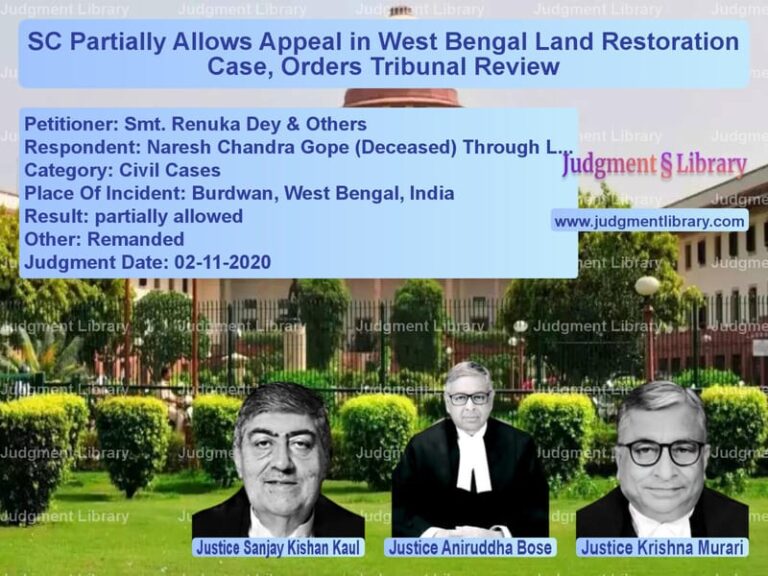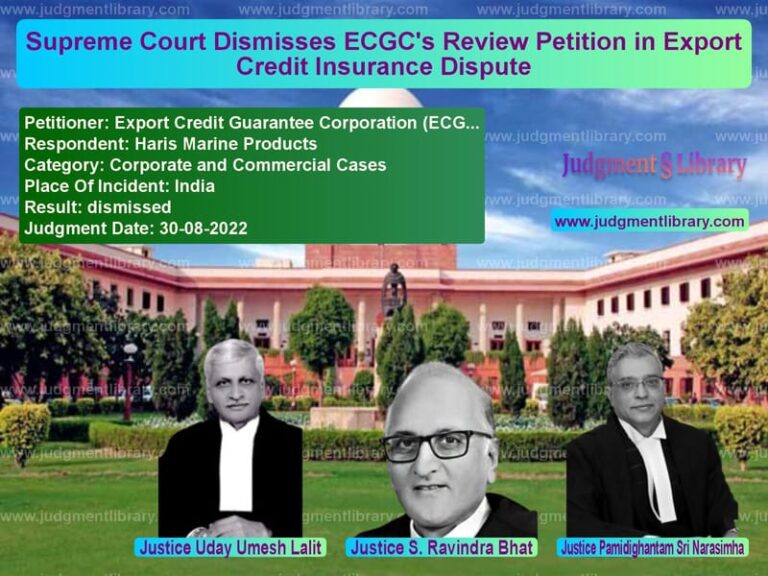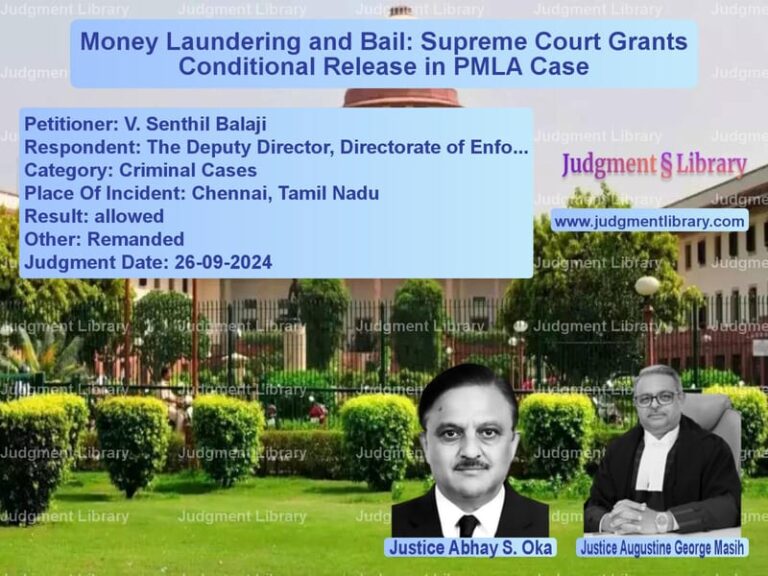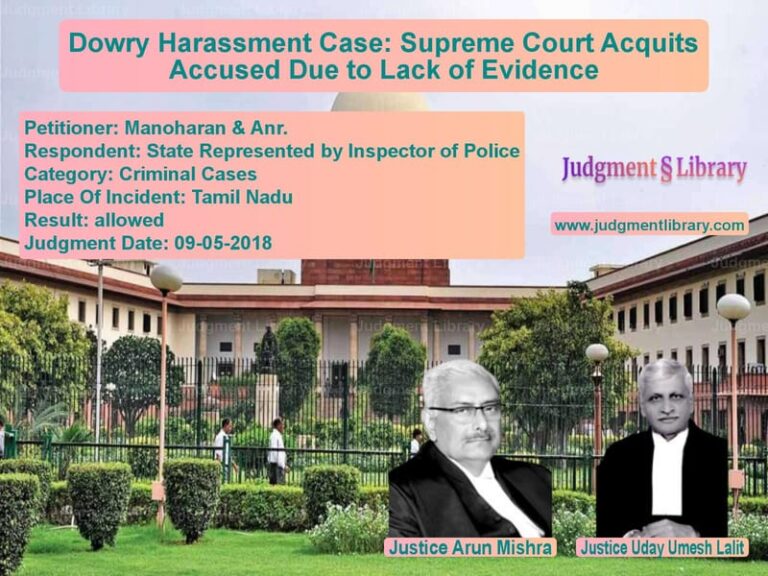Compassionate Appointment Denied: Supreme Court Upholds Government Policy
The case of State of Himachal Pradesh vs. Parkash Chand deals with the issue of compassionate appointment and whether a dependent of a deceased government employee can claim a right to employment when another family member is already in service. The Supreme Court examined the policy framework governing such appointments and ruled in favor of the government, reinforcing the principle that compassionate appointments are not an absolute right.
Background of the Case
The father of the respondent, Parkash Chand, was employed as a Peon in the Revenue Department of the State of Himachal Pradesh. He passed away on 4 January 1997 while in service. At the time of his father’s death, the respondent was a minor. As per the compassionate appointment policy framed by the State Government, if none of the children of a deceased government employee have attained the age of majority at the time of the employee’s death, the eldest child is eligible to apply upon turning 21.
The respondent attained majority on 17 November 2002 and subsequently applied for compassionate appointment. However, his application was rejected on 25 April 2008 on the ground that his elder brother was already employed in the Himachal Pradesh Electricity Board. The respondent challenged this rejection before the High Court of Himachal Pradesh, which ruled in his favor. The State of Himachal Pradesh then appealed this decision before the Supreme Court.
Petitioner’s Arguments (State of Himachal Pradesh)
- The compassionate appointment policy explicitly states that if one or more members of the family are already employed in the government or autonomous bodies, another family member is not eligible for compassionate appointment.
- The respondent’s elder brother was working in the Himachal Pradesh Electricity Board, which is a government undertaking, and therefore, the application was lawfully rejected.
- The High Court overstepped its jurisdiction by directing the government to consider an application that did not fulfill the eligibility criteria.
- Compassionate appointment is an exception to the general rule of public employment and must be strictly governed by policy terms.
Respondent’s Arguments (Parkash Chand)
- His elder brother was living separately for 17 years and was not supporting the family, as evidenced by a certificate issued by the Gram Panchayat Pradhan.
- The rejection of his application was arbitrary and did not take into account the financial hardship faced by the family.
- The High Court was justified in intervening since the rejection violated the principles of fairness and natural justice.
Supreme Court’s Judgment
The Supreme Court, in a decision delivered by Justices Dr. Dhananjaya Y. Chandrachud and Hemant Gupta, ruled in favor of the State of Himachal Pradesh and overturned the High Court’s decision. The Court’s key findings were:
- Policy Compliance: The compassionate appointment policy explicitly states that if a family member is already in government service, another dependent cannot claim a right to employment. The respondent’s application was correctly rejected as per policy.
- Judicial Overreach: The Court held that the High Court overstepped its jurisdiction by virtually rewriting government policy, which is not permissible under judicial review.
- Financial Support Not a Criterion: The policy provides an exception for widows claiming that employed children do not support them, but no such exception applies to other dependents like the respondent.
- Time Lapse in Application: The father of the respondent passed away in 1997, but the writ petition was filed only in 2010, making it an unreasonable delay.
Observations from the Judgment
The Court cited precedents from past cases, including Umesh Kumar Nagpal vs. State of Haryana and Punjab National Bank vs. Ashwani Kumar Taneja, and reaffirmed the principle that compassionate appointments are an exception and not a fundamental right.
“In the exercise of judicial review under Article 226 of the Constitution, it was not open to the High Court to re-write the terms of the policy.”
The Court further emphasized:
“Compassionate appointment must be governed strictly by the terms of the policy laid down by the State and cannot be claimed as a matter of right.”
Impact of the Judgment
This ruling has significant implications for employment policies in government services:
- It reinforces that compassionate appointment is subject to strict policy terms and not an inherent right.
- It clarifies that courts cannot mandate the government to grant appointments in violation of policy.
- It underscores the importance of timely applications and prevents misuse of compassionate appointment schemes.
Conclusion
The Supreme Court’s judgment in State of Himachal Pradesh vs. Parkash Chand upholds the principle that compassionate appointments must be governed by existing policies and not judicial discretion. This ruling serves as an important precedent for ensuring fairness and consistency in public employment decisions.
Petitioner Name: State of Himachal Pradesh.Respondent Name: Parkash Chand.Judgment By: Justice Dhananjaya Y. Chandrachud, Justice Hemant Gupta.Place Of Incident: Himachal Pradesh.Judgment Date: 17-01-2019.
Don’t miss out on the full details! Download the complete judgment in PDF format below and gain valuable insights instantly!
Download Judgment: State of Himachal Pr vs Parkash Chand Supreme Court of India Judgment Dated 17-01-2019.pdf
Direct Downlaod Judgment: Direct downlaod this Judgment
See all petitions in Employment Disputes
See all petitions in Public Sector Employees
See all petitions in Recruitment Policies
See all petitions in Judgment by Dhananjaya Y Chandrachud
See all petitions in Judgment by Hemant Gupta
See all petitions in allowed
See all petitions in Quashed
See all petitions in supreme court of India judgments January 2019
See all petitions in 2019 judgments
See all posts in Service Matters Category
See all allowed petitions in Service Matters Category
See all Dismissed petitions in Service Matters Category
See all partially allowed petitions in Service Matters Category







